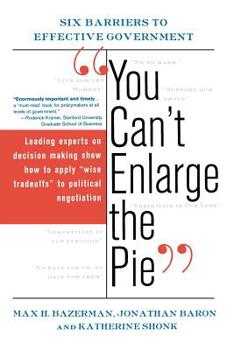You Can't Enlarge the Pie: Six Barriers to Effective Government
Select Format
Select Condition 
Book Overview
Why do our government leaders continually make decisions and craft policies that everybody knows are foolish? Because they, like the rest of us, remain trapped in foolish and unproductive habits of thinking. "You Can't Enlarge the Pie" analyzes the unspoken assumptions that lead to bad policy, wasted resources, and lost lives, and shows exactly why they're wrong. With fascinating case studies and clear, compelling analysis, it dissects six psychological barriers to ineffective government:1. Do no harm. 2. Their gain is our loss.3. Competition is always good. 4. Support our group. 5. Live for the moment.6. No pain for us, no gain for them. By freeing ourselves from the narrow way we evaluate our government leaders, we can learn to judge their performance more as that of business leaders is judged: by the overall health of their organizations.
Format:Paperback
Language:English
ISBN:0465006329
ISBN13:9780465006328
Release Date:August 2002
Publisher:Basic Books
Length:288 Pages
Weight:0.85 lbs.
Dimensions:0.7" x 6.1" x 9.0"
Customer Reviews
2 ratings
Not what I thought but good
Published by Thriftbooks.com User , 18 years ago
I was hoping this would deal with more individual level problems, such as managment, etc.... But it is definitely more of a global view. Still very interesting and enjoyable.
Better Government Through Tradeoffs!!
Published by Thriftbooks.com User , 22 years ago
No one will ever accuse government of acting like a business and accordingly, there has been a slew of books that suggest that government should. Most authors on the subject have said the same thing: efficiency, competitive incentive and the like are the tools government should adapt in order to have the success that business enjoys. These authors disagree slightly. The key to effective business management and the trick government has yet to master is the art of trade-off. Instead of making choices based on absolutes and win/lose scenarios, government should decide policy based on maximizing gains while taking small losses. While this is the main thread of the book, the authors are far from redundant. They apply trade-off technique to many different scenarios: Environmental policy (wherein government should work WITH businesses, not on top of them), procurement of sports teams (wherein state and county government should accept that overbidding does more damage than good), tobacco subsidies (might it be better if tobacco farmers lose their jobs rather than every american contributing to a ridiculous scheme?) and others. What's more, this book, aside from honestly being the best book on government policy I've read in a year, is completely non-partisan and very objective. The authors are concerned with how to make wise choices and to do this, they focus on how to get there, not preconcieved results. They end up with a regulatory stance on campaign finance and EPA while having a free-market stance on free trade and even private road ownership as a way to reduce traffic at key hours and keep pollution in check. While people may disagree with some of their conclusion, the premise of the book, better living through trade-offs, is a great one that is taken to great heights in this book.






